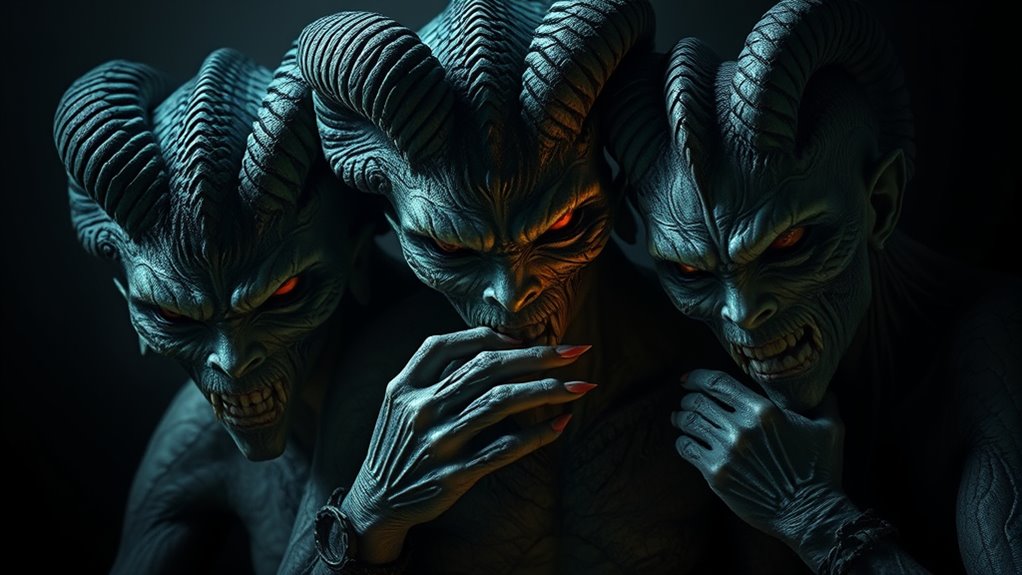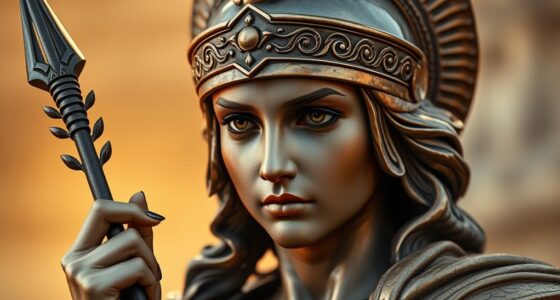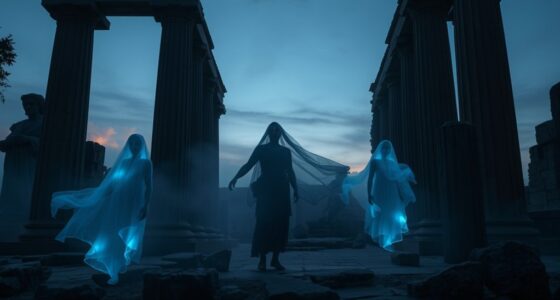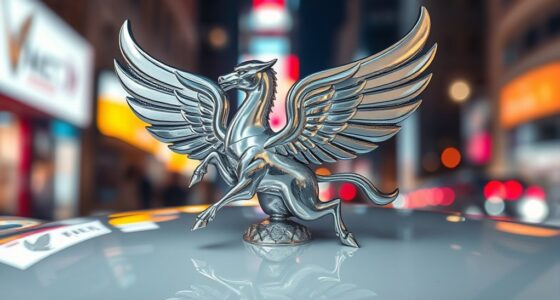Gorgons and Graeae, once feared mythological monsters, now symbolize female strength, resilience, and autonomy. Gorgons like Medusa remind us that femininity can be powerful and challenging traditional roles. The Graeae embody wisdom and collective power despite their age and appearance. Their stories challenge societal norms and inspire modern ideas of empowerment. If you continue exploring, you’ll discover how these female monsters inspire conversations about gender, strength, and redefining femininity today.
Key Takeaways
- Gorgons and Graeae symbolize complex female archetypes, challenging traditional notions of femininity through themes of wisdom, resilience, and autonomy.
- Modern reinterpretations view Gorgons like Medusa as empowered figures, emphasizing strength and resistance rather than mere monsters.
- The mythic figures serve as symbols of female resilience, transforming fear into empowerment and inspiring contemporary stories of female agency.
- Graeae challenge gender norms by embodying collective wisdom and cunning, regardless of age or appearance.
- These monsters highlight that female strength encompasses intelligence, resilience, and independence, redefining societal views of femininity.

Have you ever wondered how female monsters in mythology challenge traditional notions of power and femininity? Creatures like Gorgons and Graeae have captivated and terrified audiences for centuries, embodying a mix of danger, mystery, and strength. Their origins, rooted in ancient myths, reveal a complex portrayal of female power that often defies societal expectations. The mythical origins of Gorgons, especially Medusa, trace back to Greek mythology, where they are described as terrifying beings with snakes for hair and the power to turn anyone who gazes upon them to stone. These stories served as cautionary tales but also as symbols of formidable female strength, turning femininity into a source of deadly power rather than weakness. Over time, these mythic figures have been adapted in modern storytelling, shifting from mere monsters to symbols of empowerment. Contemporary adaptations often reframe Gorgons and similar creatures as figures of resilience, emphasizing their autonomy and the complexity of their characters. Think of movies, books, and art that portray Medusa not just as a villain but as a victim of circumstances, a symbol of misunderstood power, or even a feminist icon challenging patriarchal narratives. The myth’s evolution highlights how societies reinterpret these female monsters, transforming their fearsome qualities into symbols of resistance and strength. Similarly, the Graeae, three old women in Greek myth who shared one eye among them, challenge traditional gender roles. These sisters, often depicted as wise but grotesque, possess secret knowledge that makes them powerful despite their decrepit appearances. Their mythic origins lie in stories that depict them as guardians of hidden truths, emphasizing intelligence and cunning over physical strength. Modern adaptations of the Graeae often explore themes of wisdom and resilience, portraying them as symbols of female agency and the importance of collective strength. They challenge the idea that age or appearance diminishes female power, instead highlighting that knowledge and unity can be formidable sources of influence. Both Gorgons and Graeae serve as mythic archetypes that question conventional ideas about femininity, showcasing women as fierce, autonomous, and complex beings. In modern culture, these monsters have become symbols of female empowerment, inspiring stories that celebrate strength in all its forms. Their mythic origins remind us that female monsters, far from being simple villains, are rich symbols that challenge and redefine our understanding of power, femininity, and resilience. Interestingly, the reinterpretation of these creatures in modern media demonstrates how mythology continues to inspire contemporary discussions about gender and strength. By examining their stories, you see how mythology continues to offer powerful lessons about challenging societal norms and embracing female strength in all its forms.
Frequently Asked Questions
What Are the Origins of Gorgon and Graeae Myths?
The mythological origins of these stories reflect deep gender symbolism, highlighting fears and societal views of women. You see, these myths likely stem from ancient cultures trying to explain natural phenomena or social roles through symbolic storytelling. By exploring these origins, you understand how myths encode complex ideas about gender, power, and fear, revealing the ways ancient societies used myth to make sense of their world and the roles women played within it.
How Did Female Monsters Influence Modern Horror Genres?
You see, female monsters influence modern horror by embodying themes of female villainy and monster femininity. They challenge traditional gender roles, creating complex characters who evoke fear and fascination. This blend of allure and danger amplifies suspense and horror, making audiences confront societal anxieties about female power. As a result, these figures reshape how we perceive female characters, transforming horror genres into reflections of deeper fears and the complexities of female identity.
Are There Cultural Variations of Gorgons and Graeae Worldwide?
Imagine a tapestry woven with threads from different cultures—this is how mythical representations and cultural adaptations vary worldwide. You’ll find female monsters in diverse forms, reflecting unique fears and values. From Japanese yama-uba to African water spirits, these figures embody local myths. So, yes, cultural variations of female monsters exist globally, showing how societies adapt myth to mirror their beliefs and anxieties, creating a rich, interconnected web of folklore.
What Symbolic Meanings Are Associated With These Female Monsters?
You see, these female monsters symbolize powerful themes like female empowerment and societal fears. They often represent the dangerous yet misunderstood aspects of femininity, challenging traditional gender roles. Their fierce attributes can inspire empowerment, showing women’s strength and resilience. At the same time, they reflect societal fears about female power, cautioning against perceived threats. These monsters embody complex emotions and societal tensions surrounding gender, making them enduring symbols across cultures.
How Have Perceptions of Female Monsters Evolved Over Time?
You see that perceptions of female monsters have shifted from viewing them as mere threats to symbols of female empowerment. Society’s fears often reflected anxieties about women’s independence, but today, these monsters are celebrated as powerful figures challenging traditional gender roles. You might notice that modern interpretations emphasize their strength and resilience, transforming societal fears into symbols of empowerment and breaking stereotypes about female power and vulnerability over time.
Conclusion
As you explore these female monsters, you realize they’re like fierce storms—powerful, unpredictable, and unstoppable. Gorgons and Graeae aren’t just terrifying creatures; they’re symbols of women’s strength and resilience in myth. Their stories remind you that even in chaos, there’s a kind of beauty and power that can’t be silenced. Embrace their fierce spirit, and let it inspire you to stand tall like a mountain weathering the fiercest winds.









